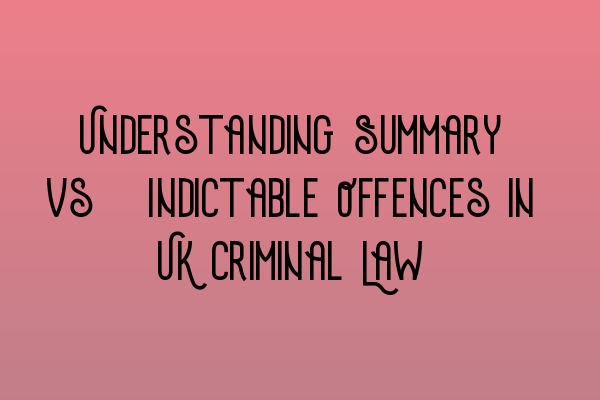Understanding Summary vs. Indictable Offences in UK Criminal Law
When it comes to the criminal justice system in the UK, offences are broadly categorized as either summary or indictable. It is essential to understand the distinction between these two types of offences, as it can have significant implications for the legal process and potential penalties. In this article, we will delve into the differences between summary and indictable offences and shed light on their respective characteristics and consequences.
Summary Offences: An Overview
Summary offences, also known as minor offences, are relatively less serious crimes that are typically heard in a magistrates’ court without a jury. These offences are generally punishable by a maximum of six months’ imprisonment or a fine, or both.
Common examples of summary offences include public disorder, drunk driving, petty theft, and minor assaults. These offences do not usually involve complex legal issues and are resolved more swiftly compared to indictable offences.
Indictable Offences: An Overview
Indictable offences are more serious crimes that are usually heard in a Crown Court with a judge and jury. These offences cover a wide spectrum of criminal conduct and have varying degrees of severity. The penalties for indictable offences are generally more severe than those for summary offences and can range from fines to lengthy terms of imprisonment.
Examples of indictable offences include murder, sexual assault, robbery, fraud, and drug trafficking. Due to their gravity and complexity, these offences require a more thorough investigation and a comprehensive legal process.
Hybrid Offences: A Third Category
It is worth mentioning that there is a third category of offences known as hybrid offences, also referred to as ‘either-way’ offences. These offences have characteristics of both summary and indictable offences, and their classification depends on various factors, including the severity of the offence and the defendant’s criminal history.
For hybrid offences, the prosecution has the discretion to choose whether to proceed summarily or indictably. Less serious cases are typically dealt with in the magistrates’ court, while more severe cases are sent to the Crown Court.
The Legal Process for Summary Offences
Summary offences are usually dealt with in magistrates’ courts, where the defendant’s guilt or innocence is determined by a magistrate. These courts are presided over by a single magistrate or a panel of three magistrates. A solicitor can represent the defendant in these proceedings.
If the defendant is found guilty of a summary offence, the magistrate imposes the appropriate penalty, which can include a fine, community service, or a short period of imprisonment. In some cases, the defendant may have the opportunity to appeal the decision to a higher court.
The Legal Process for Indictable Offences
As mentioned earlier, indictable offences are usually heard in the Crown Court with a judge and jury. The defendant’s guilt or innocence is determined by the jury based on the evidence presented during the trial. The defendant has the right to legal representation, and a barrister is typically engaged to advocate for their case.
If the defendant is found guilty of an indictable offence, the judge imposes the appropriate penalty, taking into account the seriousness of the offence and any mitigating or aggravating factors. The defendant also has the right to appeal the decision to a higher court if they believe an error has occurred during the trial.
Conclusion
Understanding the distinction between summary and indictable offences is crucial in navigating the UK criminal justice system. Summary offences are minor infractions heard in magistrates’ courts, while indictable offences are serious crimes that require a trial in the Crown Court. Hybrid offences present a unique category that can be treated as either summary or indictable, depending on various factors.
For more information about SQE Criminal Law & Practice, feel free to explore our other articles:
- SQE 1 Practice Exam Questions
- SQE 1 Practice Mocks FLK1 FLK2
- SQE 2 Preparation Courses
- SQE 1 Preparation Courses
- SRA SQE Exam Dates
At SQE Criminal Law & Practice Law UK, we provide comprehensive training and support for aspiring solicitors in criminal law. If you have any questions or require further assistance, please don’t hesitate to contact us.
